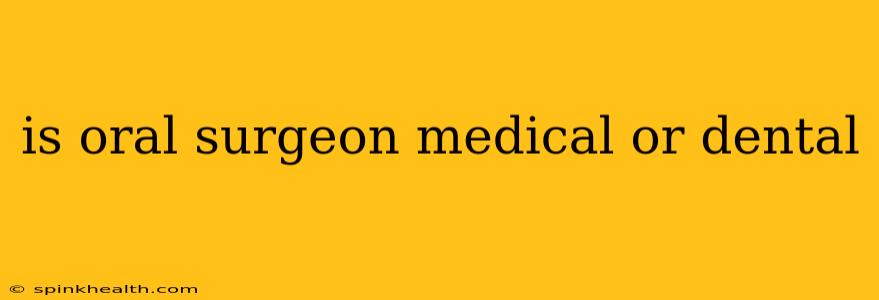Is an Oral Surgeon Medical or Dental? The Tale of Two Professions
The question of whether an oral surgeon is medical or dental is a surprisingly common one, and the answer isn't a simple "either/or." It's a fascinating blend of both worlds, a testament to the intricate relationship between medicine and dentistry. Think of it like this: it's a delicious fusion dish, not just a single ingredient.
Imagine a young, ambitious individual with a passion for helping people overcome oral health challenges. This individual could embark on a journey focusing solely on the dental side – studying teeth, gums, and preventative care. Or, if their inclination leans towards more complex procedures and a deeper understanding of the intricate systems of the head and neck, they might choose a different path. This is where the story of the oral surgeon begins.
What Makes an Oral Surgeon Unique?
Oral surgeons are actually both medical and dental professionals. They possess a unique skillset requiring extensive training in both fields. Their journey begins with dental school, just like a general dentist. However, their training extends far beyond that, requiring several years of additional, rigorous residency in oral and maxillofacial surgery.
During this residency, they gain specialized expertise in a wide range of complex procedures. We're talking about everything from wisdom teeth extractions (a common procedure many associate with oral surgery) to reconstructive surgery of the jaw and face, the management of facial trauma, and even the placement of dental implants.
H2: What are the Key Differences Between Oral Surgeons and General Dentists?
This is a crucial distinction. While both work with the mouth and teeth, their scopes of practice differ considerably. General dentists focus on preventative care, routine cleanings, fillings, and basic extractions. Oral surgeons, on the other hand, manage the more complex surgical procedures. They tackle issues far beyond what a general dentist's training equips them to handle.
H2: Does an Oral Surgeon Need a Medical License?
This is another common query. The answer is nuanced. While they don't need a separate medical license in the same way a physician would, their rigorous training and scope of practice often overlap significantly with medical specialties. Their specialized surgical training equips them to handle complex medical issues involving the face, jaw, and neck.
H2: What kind of medical conditions might an oral surgeon treat?
Oral surgeons often deal with conditions extending beyond just teeth. Think about facial fractures resulting from trauma, corrective jaw surgery for temporomandibular joint (TMJ) disorders, or the removal of oral cancers. These are all areas requiring a high level of medical knowledge and surgical skill.
H2: What type of education is required to become an oral surgeon?
Becoming an oral surgeon requires a significant commitment to education and training. It's a long, challenging, but ultimately rewarding path. The journey typically includes:
- Four years of dental school: This establishes a solid foundation in dentistry.
- Four to six years of oral and maxillofacial surgery residency: This intense postgraduate training refines surgical skills and deepens medical knowledge.
In conclusion, the question of whether an oral surgeon is medical or dental isn't a simple binary choice. They are uniquely positioned at the intersection of both fields, expertly blending dental and medical expertise to provide comprehensive care for a wide array of oral and maxillofacial conditions. They are specialists who require a highly specialized skillset and years of advanced training to master their art.

